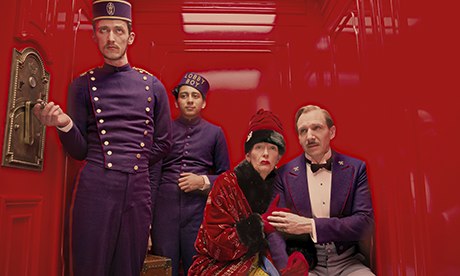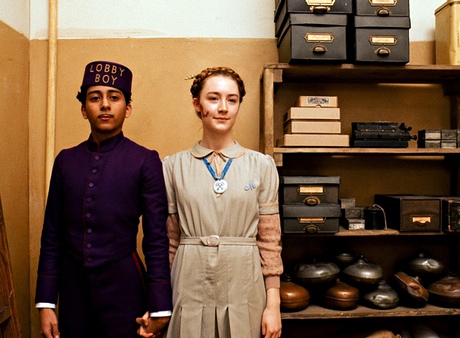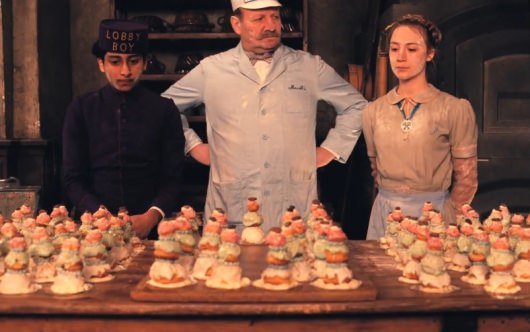 |
| Think pink. Welcome to the Grand Budapest. |
Popular this year in Andersonia: mustaches, the colors purple and pink...and yet more mustaches. Continuing to trend very well: uniforms, exotic names and art direction so inlaid with detail and saturated with color to produce retinal overload or high blood sugar. Or both. If mise-en-scene be the food of love, give me surfeit of it! one might say...if one happened to wander off the set of Twelfth Night and onto the set of Wes Anderson's latest film, where the forgetting of one's lines, not to mention connection to life on planet Earth would be quite understandable.
It is the fictional European Alpine state of Zubrowka in which Grand Budapest Hotel is set. But make no mistake: we're deep, deep in the heart of Andersonia. Perhaps deeper than we have yet been, we brave souls who have witnessed all eight of the director's feature-length films. Yet only eight? Can that be possible? Surely there has been enough madly specific art direction, ample bolts, nay acres of colorful fabric, enough preciously-named (I suppose Anderson comes by this somewhat naturally; his father is named Melver, after all) characters to fill up two dozen epics.
But no, this is but number eight. And one can't help but wonder, even for devoted fans and American critics ever ready to rubber stamp Wes Anderson's visually rich work as a kind of genius, if there is a limit to which these films about virtually nothing can continue to fill seats in the art house. The Sunday night screening I attended in Chicago was more full than not . But by the time the stories within stories had concluded and retracted to their point of origin, after all the color and wit had been served, there was a kind of sated silence in the group amongst which I sat, suggestive of people who had devoured too much dessert without eating any dinner.
 |
| For those who were wondering...Grand Budapest Hotel is presented in color. |
The Grand Budapest Hotel, at least the grand 1930's version of the hotel which is featured in much of the film, seems an apt metaphor for Wes Anderson's body of work. Former lobby boy Mr.Moustafa (F. Murray Abraham) reminisces about Monsieur Gustave (Ralph Fiennes), calling him "a glimmer of civilization in the barbaric slaughterhouse we know as humanity," recycling one of his mentor's own pronouncements. So too, it would seem, is the Grand Budapest. There is coursing through the films of Wes Anderson a longing for a different, prettier, more orderly world. Not so much a world gone by as one that never quite existed. Understandable, perhaps, in this oft ugly world of actuality that is ours. But potentially cloying in its richness and repetition.
Not surprisingly, we don't walk right through the entrance of the Grand Budapest as the film begins. Christmas with Uncle Wes involves finding one's present in a box...within a box, within a box...within yet another box. In each case, of course, the wrapping is immaculate. We first see a young woman, presumably in the relative present, with a book (in pink hardcover) of the same title as the film. She leaves a key on a monument to a writer. That author (Tom Wilkinson), offers in the 1980's a brief disquisition on the nature of the writer's imagination and work...when not fending off an obnoxious kid lurking in the same the room. The author refers us to the source of his story, related by the adult Zero Moustafa to yet another writer (Jude Law). This is the 1960's Grand Budapest, not really so grand anymore. This older Zero (who, one must say, has aged considerably in the space of 35 or so years...), now the owner, still sleeps in his tiny servant's quarters. The ever-detailed art direction of Anderson's films (led by Stephan O. Gessler in this case) makes the appropriate adjustments for the heading downhill aesthetics of the 1960's. The deep saturation bombing of red, pink and purple of the 30's hotel gives way to a 60's palette of gold, orange and muted yellow.
So, all of this before Grand Budapest Hotel begins in earnest. It's a kind of hypnosis, the stories as nesting dolls, the intricate framing. One could easily be lulled into submission before the frenetic plot and candy store of colors of the central story commence. And perhaps that's the idea. Heaven knows it has worked quite well on American critics, as ever a complimentary zombie chorus.
The big pink of the 30's Grand Budapest (whose interiors where shot in disused German department store) is the aesthetic focus of Mr. Anderson's latest film. Its concierge, Monsieur Gustave, is the hero. M. Gustave is certainly as close we get to a real character in Grand Budapest Hotel. There are not quite three dimensions of humanity contained within the purple uniform of the concierge, but the one or two we see as the film plays out certainly teem with amusing detail.
 |
| Tilda
Swinton as Madame D - rich, old, insecure, |
The dapper devil must be given his due: Wes Anderson has wit. And it is through the vehicle of M. Gustave that it finds its best and most frequent expression in Grand Budapest Hotel. "...oh, dear God. "What have you done to your fingernails?," Gustave asks of his aged paramour before she departs the hotel for the last time. Taken aback, she responds, "I beg your pardon." "This diabolical varnish. The color is completely wrong," Gustave can't help but comment.
Much of the concierge's personality is captured in the more complimentary words he has for Madame D, when he sees her laid out in her coffin. "You're looking so well, darling. You really are. I don't know what sort of cream they've put on you down at the morgue, but I want some." Among his accomplishments, Monsieur Gustave might the most flamboyantly heterosexual man in Zubrowka, if not the solar system.
With the unforgettable concierge, ever walking briskly ahead of a vapor trail of his signature fragrance, "L'air de Panache," Grand Budapest Hotel enjoys its best moments. Be the concierge straight, gay or Andersonian other, Ralph Fiennes reminds us how convincingly he can play from the entire spectrum of maleness. He's done this from the start, following his breakthrough performance in Schindler's List as the quietly brutish Nazi Amon Goeth with much gentler characters, as with his starring roles in Quiz Show and Oscar and Lucinda (there a supremely passive man). In the past decade, the brightly clad M. Gustave, who tends to refer to even strangers as "darling," comes after Fiennes has quite credibly played a Cockney crime boss in In Bruges and the braces wearing old school bureaucrat destined to become the the next M, in Skyfall (sadly, the entire Bond franchise seems to have veered toward an old school machismo, complete with reinstalled glass ceiling).
In the person of Gustave, Anderson also grounds Grand Budapest Hotel, if ever so slightly, to Earth. The concierge's general tone of conversation might be as fragrant as his cloud of L'air de Panache, but occasionally even his veneer of gentility drops, as when we hear the first iteration of the line later repeated by Zero, "You see, there are still faint glimmers of civilization left in this barbaric slaughterhouse that was once known as humanity. Indeed that's what we provide in our own modest, humble, insignificant... oh, fuck it." A tenuous verbal connection to human existence as we might recognize it, but Gustave's occasional, exasperated resort to the profane provides some needed salt amid the mountains of sugar that constitute Grand Budapest Hotel.
Mr. Fiennes as Gustave is joined in his adventures by many Anderson veterans. In addition to Messrs. Schwartzman, Murray and Wilson (Owen), Brody, Norton, Swinton, etc., a growing list of luminaries have been swept up in the avalanche of obsessive mise-en-sence, wardrobe, dialog and soundtrack which is Grand Budapest Hotel and the Wes Anderson experience in general. In addition to the aforementioned newcomers Fiennes, Abraham, Wilkinson and Law, there is Jeff Goldblum, Mathieu Almaric and a disturbingly shirtless Harvey Keitel. Say what you will, but the director does throw a party with an impressive guest list.
 |
| Villains conveniently clad rather villainously - Willem Dafoe and Adrien Brody in Grand Budapest Hotel. |
 |
| A shirt, please, for Mr. Keitel. And perhaps a bra. |
| Edward Norton as the basically charming Naz...er, Inspector Henckels. |
The other two newcomers to Andersonia are Tony Revolori as the young Zero Moustafa, lobby boy in training, and Soirse Ronan as Agatha, Zero's love interest and comrade in cloak and dagger. Ms. Ronan, instead of flashy wardrobe, bears an exotic birthmark (M. Gustave describes it as shaped like Mexico; it looks more like a sea horse) along her right cheek, is winsome and charming enough for her part. Revolori drifts between a low, low-key charm and nonentity as Zero. Of course, there's not a whiff of chemistry between Zero and Agatha. This hardly a new development in Wes Anderson's films, where it's usually difficult to imagine sex taking place at all, as so little blood would seem to flow beneath the pretty surface of his work.
The death of Madame D sets in motion Grand Hotel Budapest's frenetic plot. Poor Gustave is both charged with her murder and pursued by Madame's son, Dmitri (Brody). The clearly up to no good Dmitri Desgoffe-und-Taxis (even the Russians could look askance at Anderson's nomenclature) fumes when the reading of his mother's will reveals that the valuable painting, "Boy With Apple" (like the L'air de Panache scent, the portrait was commissioned for the film) is to go to her former lover. When he sees the hostility with which the bequest is met, Gustave decides to make off with the painting - "The rest of his shit is worthless junk," he confides to Zero, surveying the opulence in Madame D's home.
In its occasional, almost cartoonish detachment from reality, Grand Budapest Hotel seems of a piece with Anderson's satisfying Fantastic Mr. Fox. Several of the exterior shots require CGI or outright animation (let's call it AGI - Anderson Generated Imagery). These on lofty alpine walkways or towers, hotel funiculars and the like. There is also a fanciful, snowy chase in which Gustave and Zero are pursued by Dmitri's henchman, Jopling (Willem Dafoe).
The lives of M. Gustave, Zero, Agatha and all in Zubrowka are complicated by an army invasion, the approach of war. This is 1930's Europe after all. Setting a story on the the continent during that fraught decade without acknowledging the forming dark clouds is perhaps even beyond Wes Anderson's ability to skirt reality.
Thus, trains shuttling M. Gustave and Zero are twice stopped in the middle of a barley field. The first interlopers are a grey-clad unit of "police," led by the basically decent Inspector Henckels, well disposed to Gustave because the concierge showed him kindness while he was a lonely boy languishing during his parent's stay at the Grand Budapest. Among the second wave, the black-uniformed death squad called the "ZZ," Gustave finds no such favor. These ostensible Nazi's seem present mainly as further exercises in uniform. Gustave might rail against their limited color palette, but Anderson at the same time turns the death squad's two-letter symbol into a kind of electrified zigzag when they take over Gustave's hotel in his absence and festoon the establishment with their banners.
Depending on one's point of view, this steadfast escapism, non-engagement with a harsh history so close at hand, is perhaps a kind of strength. Or just a further symptom of a child-like worldview. Not quite so painfully simplistic as something like Life is Beautiful, but nonetheless....Fantastic Mr. Fox was so satisfying because Wes Anderson finally found medium, a kind of animation, which suited his framing and exuberant mise-en-scene. The story's simple parable was a satisfying marriage of form and content. As Anderson veers toward any unseemly human reality, he usually seems a man out of his depth.
 |
Mendl's Bakery:
a pretty, colorful vehicle delivering sweetness, seemingly
oblivious to the
realities around it. Somehow, that sounds familiar....
|
To take the example of a very different filmmaker, Steve McQueen has proven through three features that an engagement with the some of the most unpleasant aspects of human existence need in no way preclude their presentation among beautiful imagery. A hunger strike, sex addiction, alienation and slavery have all been depicted in McQueen's features amid shots of striking beauty. So goes life, wretched suffering often beneath the bluest of skies and so on. One hardly expects this level of seriousness in the work of Wes Anderson (frankly, we'll know the end is nigh should such grim subject matter present itself in his films) And any art form is richer when it finds the contributions from such disparate points of view. It does, nevertheless, seem a symptom of a consistently empty core in the writer and director's work that Nazi's are essentially evoked mainly for the purposes plot contrivance and decoration (or lack thereof, as far as Gustave is concerned).
The dreaded ZZ finally does perpetrate some murder, but it occurs so late and off-handedly in Grand Budapest Hotel to be void of impact. As with the voiceover pronouncement by the adult Zero that Agatha had succumbed at a young age to the "Prussian Grippe," Gustave's unceremonious hauling off that train stopped in the Barley field seems a late attempt to attach some emotion to a pretty, hermetic piece of work that shuns any such involvement for most of its 100 minutes. Wes Anderson's films are full of such emotional shortcuts.
Grand Budapest Hotel might offer more in terms of plot than most Anderson films, but what looked to be a virtue in its filmic confection of nothingness within a sweet and immaculate package, leaves the least satisfying aftertaste of any of the writer/director's work since the insufferable The Life Acquatic With Steve Zissou.
Anderson fans may well devour Grand Hotel Budapest with the same enthusiasm they have consumed his previous work. Just consider yourself warned: the sugar high is brief, the sugar low deep, my friends. Dine with care.
db




"This blog post takes a confrontational approach to make its point. While it may not be everyone's preferred style, it certainly commands attention and can serve as a catalyst for deeper exploration and dialogue.How be got best web hosting provider
ReplyDelete